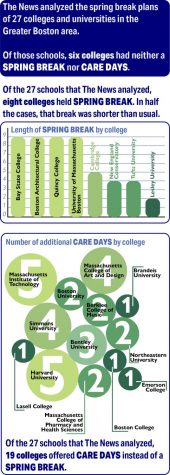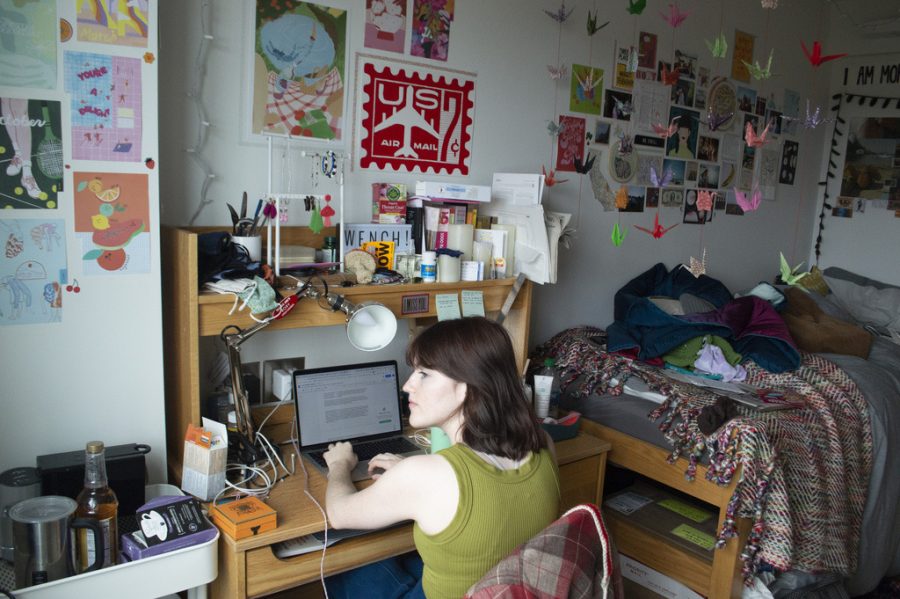Op-ed: Northeastern’s Care Days are a less than half measure
NU scheduled two Care Days to prevent burnout in response to canceling spring break.
April 14, 2021
As spring further emerges, and the semester comes to a close, it seems clear that we ought to analyze Northeastern’s handling of it. I’m sure I’m not alone when I say that this has been and is continuing to be an exceptionally challenging semester. Work seems to take twice as long as it used to, and though the end of COVID-19 seems near, it’s not here quite yet.
Speaking personally — though I’m sure these thoughts are not unique — I’m incredibly burnt out. Usually, spring break is a time to both relax in the midst of the semester and to get out of town to party. It’s the latter reason that caused universities all over the country to cancel spring break in order to deter students from travelling and spreading COVID-19. While the intention here is clearly sound, the end result of these decisions was anything but. Those with the desire and the means travelled anyway. With classes being online, it didn’t matter if a student was in their bedroom or a beach-side bungalow. Those of us who stayed behind are left with little more than a growing pile of work on Canvas and a vague hope that at some point this semester might actually end.

Northeastern’s response to the burnout that resulted from a lost spring break was the implementation of two “Care Days” scheduled for March 24 and April 12 — though the latter of these was just a holiday moved a week early. This approach is not unique. Many colleges all over the United States have opted to provide a few days off as a consolation for not providing a break. Now that these have passed, the reality of these measures seem apparent. I spent my Care Days catching up on the same work I would have done if we had class. The Care Day did little to nothing in alleviating burnout, especially given its place in the middle of the work week. Essays were still due, and exams still loomed ahead, with one day of instruction lost.
Many professors found out about the Care Days not long before they were created. Syllabi had to be adjusted and necessary learning material had to be squeezed into a tighter schedule. Professors had to figure out how to deal with the fact that a group of students was now going to be an entire class behind. Some had to consider whether or not to assign the same work or upload recorded lectures to make sure material got through to students, thereby defeating the purpose of the Care Days in the first place. To their credit, I’ve seen professors adapt quickly and creatively to this challenge, though that has nothing to do with whether or not they should have been made to face it in the first place.
This semester has been stressful and challenging. Little about it resembles the spring of just a year ago. Nevertheless, some amount of hope remains. A walk through Boston Common or on the Charles River Esplanade on a Saturday shows close-knit, though distanced, groups finally emerging in public after a year of slumber. As of April 14, more than 1.6 million people in Massachusetts are fully vaccinated. Further, Northeastern has announced that the Fall 2021 semester will be at least primarily in person with normal campus operations. It’s nice that there are things to look forward to.
It would be disingenuous to suggest that I — or anyone for that matter — have all the answers about what should have been done with spring break and the Care Days. We can only look in hindsight at these well-intentioned mistakes and offer some judgment. I can say that it might have been better to give us a Friday off instead of a Wednesday to allow for actual downtime to decompress, but that doesn’t change anything.
This is not, however, a reason to let Northeastern off the hook. The lack of an adequate response to burnout in tandem with Northeastern’s incredibly lackluster — though not new — handling of students’ mental health crises leaves a deeply bad taste. When 77% of college students say they need at least some help with mental health issues, it’s hard not to find the Care Days more than a little insulting. When a waiter is given an inadequate tip, we don’t ask them to be grateful for getting anything at all. By this same logic, we need Northeastern to start addressing problems in ways that genuinely center the well-being of students. What we don’t need is more of these less than half measures.
Harrison Staley is a third-year English and philosophy combined major. He can be reached at staley.h@northeastern.edu







